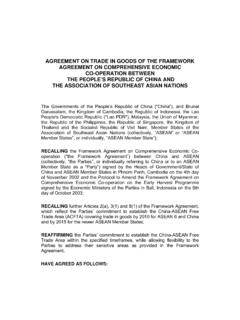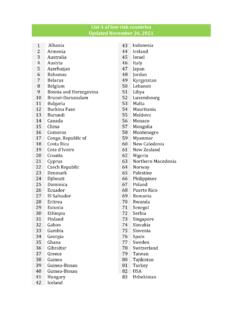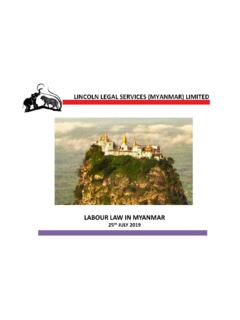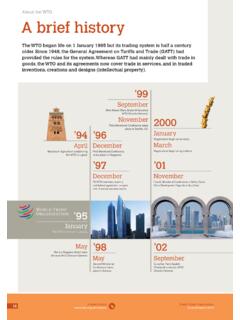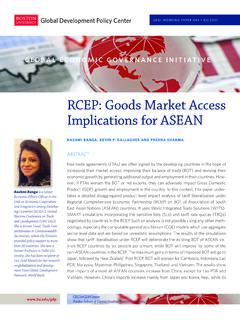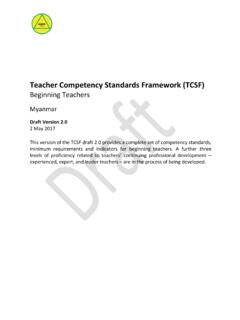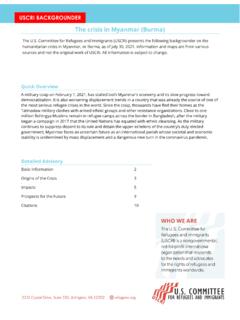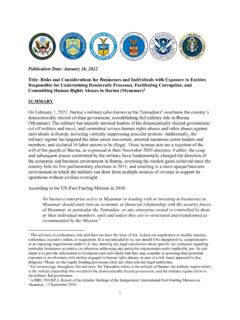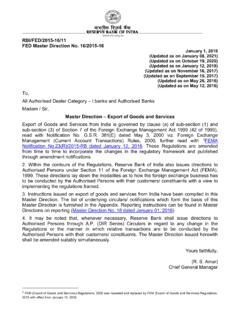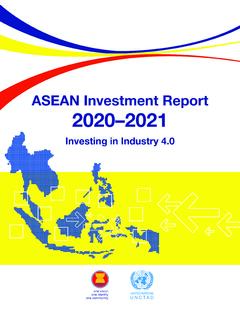Transcription of CHAPTER 12 ELECTRONIC COMMERCE SECTION A …
1 12-1 CHAPTER 12 ELECTRONIC COMMERCE SECTION A GENERAL PROVISIONS Article : Definitions For the purposes of this CHAPTER : (a) computing facilities means computer servers and storage devices for processing or storing information for commercial use; (b) covered person means: (i) a covered investment as defined in subparagraph (a) of Article (Definitions); (ii) an investor of a Party as defined in subparagraph (e) of Article (Definitions), but does not include an investor in a financial institution or an investor in a financial service supplier;1 or (iii) a service supplier of a Party as defined in Article (Definitions), but does not include a financial institution , a public entity , or a financial service supplier , as defined in Article 1 (Definitions) of Annex 8A (Financial Services); (c) ELECTRONIC authentication means the process of verifying or testing an ELECTRONIC statement or claim, in order to establish a level of confidence in the statement s or claim s reliability; and (d) unsolicited commercial ELECTRONIC message means an ELECTRONIC message which is sent for commercial or marketing purposes to an ELECTRONIC address, without the 1 For greater certainty, an investor in a financial institution or an investor in a financial service supplier may still be a covered person in relation to other investments that are not in a financial institution or in a financial service supplier.
2 12-2 consent of the recipient or despite the explicit rejection of the Article : Principles and Objectives 1. The Parties recognise the economic growth and opportunities provided by ELECTRONIC COMMERCE , the importance of frameworks that promote consumer confidence in ELECTRONIC COMMERCE , and the importance of facilitating the development and use of ELECTRONIC COMMERCE . 2. The objectives of this CHAPTER are to: (a) promote ELECTRONIC COMMERCE among the Parties and the wider use of ELECTRONIC COMMERCE globally; (b) contribute to creating an environment of trust and confidence in the use of ELECTRONIC COMMERCE ; and (c) enhance cooperation among the Parties regarding development of ELECTRONIC COMMERCE . Article : Scope3 1. This CHAPTER shall apply to measures adopted or maintained by a Party that affect ELECTRONIC COMMERCE .
3 2. This CHAPTER shall not apply to government procurement. 3. This CHAPTER shall not apply to information held or processed by or on behalf of a Party, or measures related to such information, including measures related to its collection. 4. Article (Location of Computing Facilities) and Article (Cross-Border Transfer of Information by ELECTRONIC Means) shall 2 A Party may apply the definition to unsolicited commercial ELECTRONIC messages delivered through one or more modes of delivery, including Short Message Service (SMS) or e-mail. Notwithstanding this footnote, Parties should endeavour to adopt or maintain measures consistent with Article (Unsolicited Commercial ELECTRONIC Messages) that apply to other modes of delivery of unsolicited commercial ELECTRONIC messages. 3 For greater certainty, the Parties affirm that the obligations under this CHAPTER are without prejudice to any Party s position in the WTO.
4 12-3 not apply to aspects of a Party s measures that do not conform with an obligation in CHAPTER 8 (Trade in Services) or CHAPTER 10 (Investment) to the extent that such measures are adopted or maintained in accordance with: (a) Article (Schedules of Non-Conforming Measures) or Article (Reservations and Non-Conforming Measures); (b) any terms, limitations, qualifications, and conditions specified in a Party s commitments, or are with respect to a sector that is not subject to a Party s commitments, made in accordance with Article (Most-Favoured-Nation Treatment) or Article (Schedules of Specific Commitments); or (c) any exception that is applicable to the obligations in CHAPTER 8 (Trade in Services) or CHAPTER 10 (Investment). 5. For greater certainty, measures affecting the supply of a service delivered electronically are subject to the obligations contained in the relevant provisions of: (a) CHAPTER 8 (Trade in Services); and (b) CHAPTER 10 (Investment), including Annex II (Schedules of Specific Commitments for Services), Annex III (Schedules of Reservations and Non-Conforming Measures for Services and Investment), as well as any exceptions that are applicable to those obligations.
5 Article : Cooperation 1. Each Party shall, where appropriate, cooperate to: (a) work together to assist small and medium enterprises to overcome obstacles in the use of ELECTRONIC COMMERCE ; (b) identify areas for targeted cooperation between the Parties which will help Parties implement or enhance their ELECTRONIC COMMERCE legal framework, such as research and training activities, capacity building, and the provision of technical assistance; 12-4 (c) share information, experiences, and best practices in addressing challenges related to the development and use of ELECTRONIC COMMERCE ; (d) encourage business sectors to develop methods or practices that enhance accountability and consumer confidence to foster the use of ELECTRONIC COMMERCE ; and (e) actively participate in regional and multilateral fora to promote the development of ELECTRONIC COMMERCE .
6 2. The Parties shall endeavour to undertake forms of cooperation that build on and do not duplicate existing cooperation initiatives pursued in international fora. SECTION B TRADE FACILITATION Article : Paperless Trading 1. Each Party shall: (a) work towards implementing initiatives which provide for the use of paperless trading, taking into account the methods agreed by international organisations including the World Customs Organization;4 (b) endeavour to accept trade administration documents submitted electronically as the legal equivalent of the paper version of such trade administration documents; and (c) endeavour to make trade administration documents available to the public in ELECTRONIC form. 2. The Parties shall cooperate in international fora to enhance acceptance of ELECTRONIC versions of trade administration documents.
7 4 Cambodia, Lao PDR, and myanmar shall not be obliged to apply this subparagraph for a period of five years after the date of entry into force of this Agreement. 12-5 Article : ELECTRONIC Authentication and ELECTRONIC Signature 1. Except in circumstances otherwise provided for under its laws and regulations, a Party shall not deny the legal validity of a signature solely on the basis that the signature is in ELECTRONIC 2. Taking into account international norms for ELECTRONIC authentication, each Party shall: (a) permit participants in ELECTRONIC transactions to determine appropriate ELECTRONIC authentication technologies and implementation models for their ELECTRONIC transactions; (b) not limit the recognition of ELECTRONIC authentication technologies and implementation models for ELECTRONIC transactions; and (c) permit participants in ELECTRONIC transactions to have the opportunity to prove that their ELECTRONIC transactions comply with its laws and regulations with respect to ELECTRONIC authentication.
8 3. Notwithstanding paragraph 2, each Party may require that, for a particular category of ELECTRONIC transactions, the method of ELECTRONIC authentication meets certain performance standards or is certified by an authority accredited in accordance with its laws and regulations. 4. The Parties shall encourage the use of interoperable ELECTRONIC authentication. SECTION C CREATING A CONDUCIVE ENVIRONMENT FOR ELECTRONIC COMMERCE Article : Online Consumer Protection 1. The Parties recognise the importance of adopting and maintaining transparent and effective consumer protection 5 Cambodia, Lao PDR, and myanmar shall not be obliged to apply this paragraph for a period of five years after the date of entry into force of this Agreement. 12-6 measures for ELECTRONIC COMMERCE as well as other measures conducive to the development of consumer confidence.
9 2. Each Party shall adopt or maintain laws or regulations to provide protection for consumers using ELECTRONIC COMMERCE against fraudulent and misleading practices that cause harm or potential harm to such 3. The Parties recognise the importance of cooperation between their respective competent authorities in charge of consumer protection on activities related to ELECTRONIC COMMERCE in order to enhance consumer protection. 4. Each Party shall publish information on the consumer protection it provides to users of ELECTRONIC COMMERCE , including how: (a) consumers can pursue remedies; and (b) business can comply with any legal requirements. Article : Online Personal Information Protection 1. Each Party shall adopt or maintain a legal framework which ensures the protection of personal information of the users of ELECTRONIC , 8 2.
10 In the development of its legal framework for the protection of personal information, each Party shall take into account international standards, principles, guidelines, and criteria of relevant international organisations or bodies. 6 Cambodia, Lao PDR, and myanmar shall not be obliged to apply this paragraph for a period of five years after the date of entry into force of this Agreement. 7 Cambodia, Lao PDR, and myanmar shall not be obliged to apply this paragraph for a period of five years after the date of entry into force of this Agreement. 8 For greater certainty, a Party may comply with the obligation under this paragraph by adopting or maintaining measures such as comprehensive privacy or personal information protection laws and regulations, sector-specific laws and regulations covering the protection of personal information, or laws and regulations that provide for the enforcement of contractual obligations assumed by juridical persons relating to the protection of personal information.


